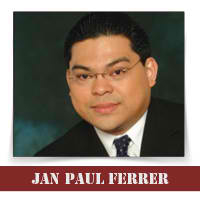
By: Jan Paul C. Ferrer
Women are poised to change the face of philanthropy. In 2018, more than 90% of high-net-worth women gave money to charity.1 Since women often play key roles in educating and other family members in giving, their philanthropic infl uence may extend far beyond their individual efforts.
Engaging in philanthropy—as an individual or as a family—can be one of the most meaningful and transformational aspects of your life. The benefi ts of charitable giving are not just measured in the dollars you donate or the fi nancial benefi ts you may receive. When charitable giving is tied to issues, values and causes that are collectively important to you and your loved ones, it becomes more than a gesture or a transaction. It enables children, parents and grandparents to work together toward addressing real problems in your local community or in the world at large. In this way, giving becomes a family affair, or even a family tradition, that is passed from one generation to the next.
Getting Started with Effective Philanthropy
Every dollar you put into the world has an impact, but how do you ensure that your charitable giving aligns with both your values and the change you hope to see in the world? Here is a quick roadmap for practicing strategic giving and maximizing your impact.
Step 1. Find your philanthropic passion. The fi rst step in your giving journey involves fi nding your philanthropic passion. Start the process of purposeful philanthropy by considering what matters to you and what you hope to accomplish. Ask yourself the following questions:
• What fi elds of interest would we like our philanthropy to address?
• What criteria will we use to identify which organizations to support?
• How important is having control over how our gift(s) are used?
• How will we measure our impact?
Creating individual or family mission and vision statements around philanthropy helps ensure that your giving is guided by a consistent set of values and goals. Once you’ve established your guidelines for giving, you will want to identify causes, issues and organizations that you would like to support. Charity-ranking organizations such as Charity Navigator or BBB Wise Giving Alliance can be useful for assessing a non-profi t organization’s fi nancial health, operational transparency and accountability in reporting on progress.
Step 2. Choose ways to give. There are many ways to give back, whether you choose to give money directly to a charity, create fi nancial vehicles to facilitate giving or donate your time to volunteering for a non-profi t organization. Each of these ways has their advantages and disadvantages, and your Financial Advisor can help you determine which method(s) of charitable giving will allow you to practice purposeful philanthropy while still pursuing your other fi nancial goals.
Step 3. Practice strategic giving. You want your giving to count, and you want to know that your charitable dollars are making a meaningful difference. To maximize your impact, you may want to consider pooling your giving with that of other like-minded individuals and families who support the same cause. Or, you can choose to tie your gifts to specifi c programs or initiatives so you can track the effectiveness of your philanthropic dollars. It’s also a good idea to stay engaged with the non-profi t organizations you support by requesting impact reports or even communicating with their leadership to understand their progress.
If you’re interested in engaging in effective philanthropy but aren’t sure where to begin, your Morgan Stanley Financial Advisor can connect you to professionals who can help you translate your philanthropic vision and values into a results-oriented, strategic giving plan.
Footnotes:
12018 U.S. Trust Study of High Net Worth Philanthropy. Disclosure:
Article by Morgan Stanley and provided courtesy of Morgan Stanley Financial Advisor.
Jan Paul C. Ferrer is a Financial Advisor in Chicago, IL at Morgan Stanley Smith Barney LLC (“Morgan Stanley”). He can be reached by email at janpaul.ferrer@ morganstanley.com or by telephone at 312 312-419-3535
Morgan Stanley Smith Barney LLC (“Morgan Stanley”), its affi liates and Morgan Stanley Financial Advisors and Private Wealth Advisors do not provide tax or legal advice. Clients should consult their tax advisor for matters involving taxation and tax planning and their attorney for matters involving trust and estate planning, charitable giving, philanthropic planning and other legal matters.
The returns on a portfolio consisting primarily of sustainable investments may be lower or higher than a portfolio that is more diversifi ed or where decisions are based solely on investment considerations. Because sustainability criteria exclude some investments, investors may not be able to take advantage of the same opportunities or market trends as investors that do not use such criteria.
©2020 Morgan Stanley Smith Barney LLC. Member SIPC. CRC# 3052745 04/20
 VIA Times – October 2020 Issue Vital News, Vibrant VIews for Asian Americans in Chicago & Midwest
VIA Times – October 2020 Issue Vital News, Vibrant VIews for Asian Americans in Chicago & Midwest

